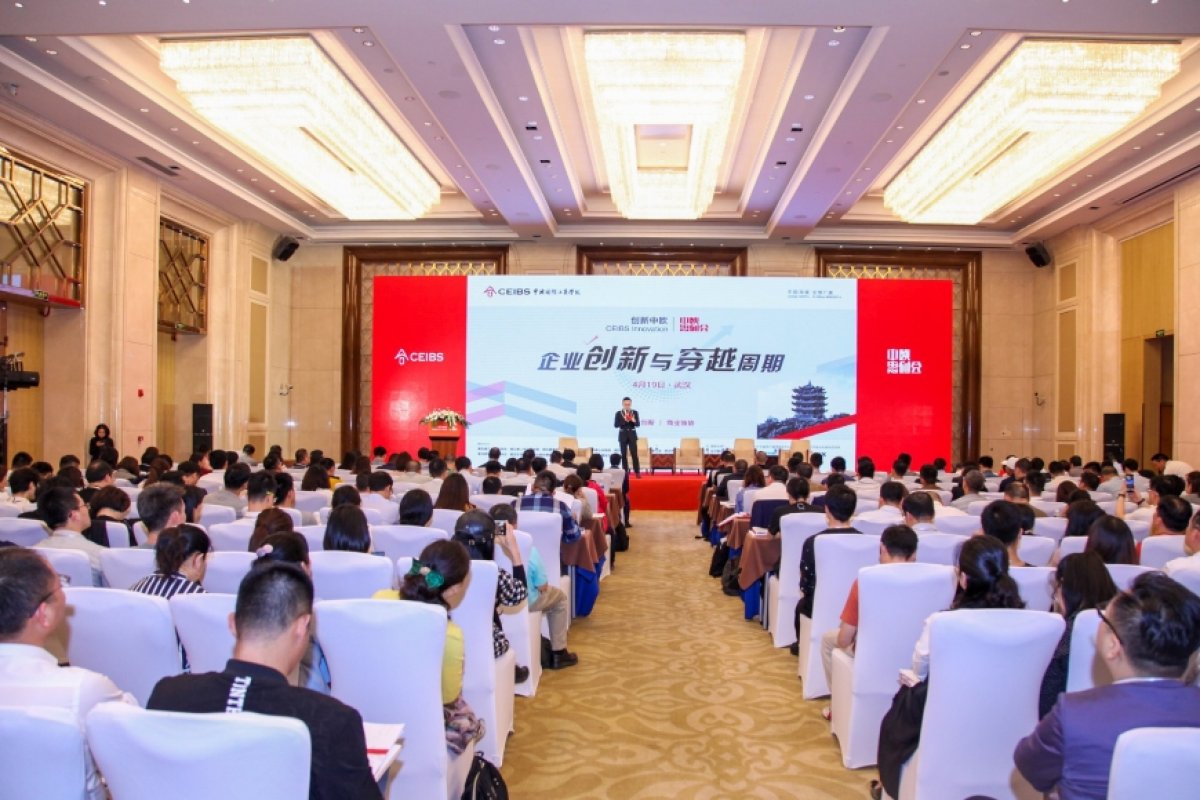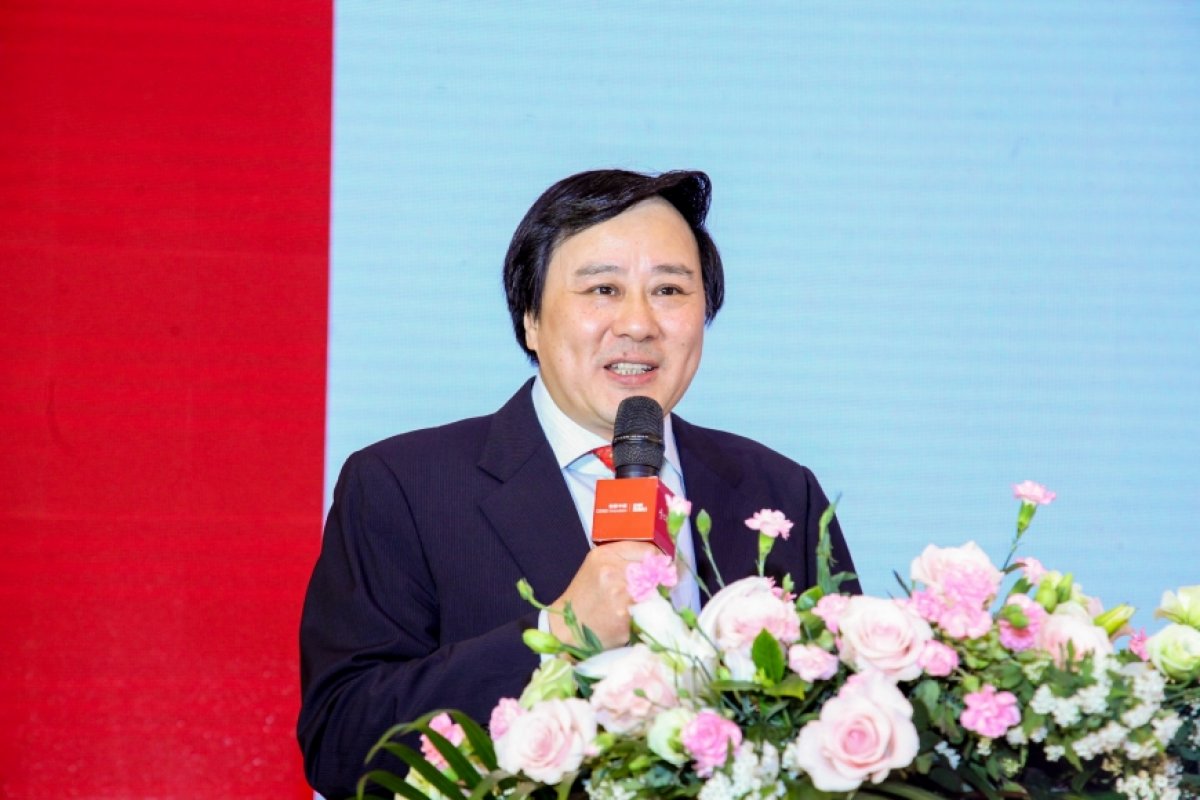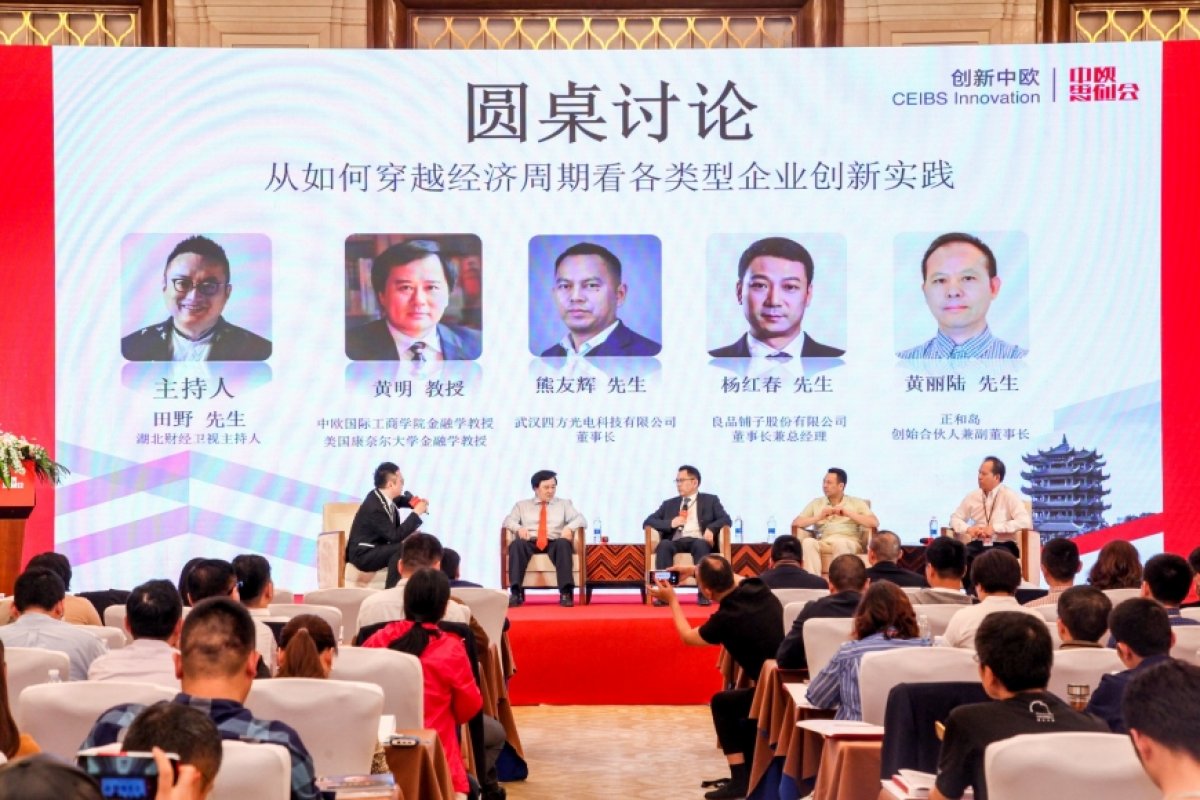Wuhan Innovation Forum Promotes Upgrade of Hubei Enterprises
April 19, 2019. Wuhan – At present, many industries in China are standing at a critical juncture of upgrade and transition. The traditional manufacturing industry, which features labour-intensive assembly plants, is now being forced to transform into a technology-intensive one adept at high-end equipment manufacturing. The high-tech industry is also at a crossroads of development, and its destiny will depend on whether it can achieve key breakthroughs in the coming years. From a macro perspective, economic fluctuations have posed numerous challenges to companies. In such a context, how can companies drive innovation, navigate the economic cycle, and keep the momentum of sustainable development?
The CEIBS Innovation Forum 2019 was held in Wuhan today, bringing together nearly 400 local entrepreneurs and executives. At the forum, Dr. Huang Ming, Professor of Finance at CEIBS and Cornell University, exchanged ideas with guests on how to boost corporate innovation and lead companies through the development cycle.
CEIBS has kept an eye on the transition and development of businesses in Central China and has contributed to the spectacular rise of this region. Wuhan, as the inland industrial powerhouse, boasts a complete modern manufacturing industry chain and a wealth of high-end equipment manufacturers. Wuhan East Lake High-Tech Development Zone, for example, has attracted multitudes of enterprises in fields like optical fibres, optoelectronic equipment, communication equipment, computers, and medicine. By hosting this high-level forum here, CEIBS hopes to introduce the latest management knowledge to Wuhan and spread it to surrounding areas, providing companies in Central China with new perspectives and solutions for their development and transition. CEIBS Assistant President Dr. Snow Zhou said in his welcome speech that CEIBS Innovation Forum, which was intended to stimulate brainstorming and encourage participants to stay relevant in a constantly changing world, has presented a great opportunity for intellectual exchange in this crucial period of economic transition and upgrade in China.
How to make companies "built to last" in the face of the development cycle?
Prof. Huang Ming delivered a keynote speech entitled, “Corporate Innovation and Financial Discipline.” During his speech, he analysed the domestic and global business landscape at the macro level and then shared two suggestions with entrepreneurs at the micro level – specifically, that they should put more effort into innovation and brand building and that they should practice tighter financial discipline.
Prof. Huang Ming told the audience that he believes companies can hardly survive without innovation. Furthermore, although R&D is a cost item in accounting, it should be deemed as the source of profit or even the lifeblood of a company. While promoting innovation, companies should also step up their branding efforts. He added that brands are built upon trust – a scare resource – between companies and consumers. To benefit from high brand value, companies should keep on building up their brands instead of focusing on pursuing short-term profits. Prof. Huang also highlighted the importance of tightening financial discipline in times of economic fluctuations. As the cornerstone of wealth preservation, financial discipline is necessary to improve the decision-making process of capital investment by minimising risks through a sound financial forecast and calculation.
Innovative practices of companies navigating the economic cycle
During the roundtable discussion which followed with Chairman of Wuhan Cubic Optoelectronics Co., Ltd. Xiong Youhui (CEIBS EMBA2014); Chairman and General Manager of Bestore Co., Ltd. Yang Hongchun (CEIBS AMP14); and Founding Partner and Vice Chairman of Zhisland Huang Lilu (CEIBS EMBA2004); Prof. Huang Ming shared his views on how companies can enhance their competitive edge and tighten financial discipline.
Xiong Youhui mentioned two major challenges facing Cubic Optoelectronics in the current development cycle. One was its limited innovation capacity compared with international rivals, and the other, uncertainties of how the market would evolve. To maintain a stable development, the company has kept abreast with global trends of development and paid close attention to market demand.
Yang Hongchun explained three changes Bestore has had to deal with – firstly, that employees were more eager for a better life; secondly, that consumers were more demanding in terms of shopping experience; and, thirdly, that technological development has had a greater bearing on the food industry and business operations. With innovative measures concerning the management model, operating model, and application of digital technologies, Bestore has maintained a steady growth in a highly competitive market.
Huang Lilu said Zhisland, as a start-up in a traditional market, was susceptible to industry cycle changes. However, by applying mobile internet technologies and upgrading its operating model, the company has added “the value of connecting” and successfully eliminated trust barriers deeply ingrained in the market to bring together entrepreneurs effectively.
Roundtable participants also took questions from the audience in the last session. Following the Wuhan Forum, the CEIBS Innovation Forum will be held in Nanjing on April 25. CEIBS professors and renowned local entrepreneurs will be invited to discuss how to break growth bottlenecks in the backdrop of digital economy and business intelligence.















